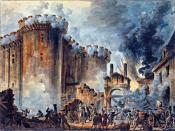FRENCH REVOLUTION "Social discontent contributed greatly to the collapse of the old order" Do you agree with this statement? Argue your case.
[Issue One]
Prior to the French Revolution in 1789, and the consequent collapse of the Old Order, France had been divided into three estates, according to the traditions and conventions of the Old Order; the Ancien Regime. The fixed classes -the First Estate, the Second Estate and the Third Estate- were demonstrably iniquitous, wherein the first and second estate enjoyed a life of power and privilege, and everyone else struggled through a life of heavy taxation, and more often than not, poor living conditions and starvation. This inequity brought about considerable social discontent, primarily amongst the Third Estate, and was exacerbated prior to the collapse of the Old Order, when taxes and cost of living expenses escalated as a result of the state of imminent economic collapse.
The Bourgeoisie, urban workers and peasants, as members of the Third Estate, were all discontent about life in France, to varying degrees and in regards to varying problems and concerns. Although social discontent was a clear contributory factor towards the collapse of the Old Order, there were other more significant forces and factors that contributed to this collapse, such as the economic crisis of bankruptcy, and the resultant political crisis of disunity amongst those in power that precluded necessary change from being implemented to address the compounding concerns.
As members of the Third estate, the Bourgeoisie were frustrated and discontent about society and the limitations imposed upon them because of the Ancien Regime. Regardless of wealth, utility or merit, they were disallowed movement into higher estates, or social mobility into positions of what they considered to be deserved power and privilege. This movement was thought to be fair and...


